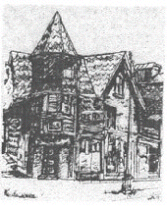INSIDE THIS ISSUE:
Robert Nisbet
Alan Britt
Jennifer Burd
Michelle Bailat-Jones
Running Cub
Elisavietta Ritchie
Odimegwu Onwumere
Laszlo Slomovits
Lyn Lifshin
Ramesh Dohan
Silvia Scheibli
Alex Ferde
Richard Kostelanetz
Richard Gartee
Irsa Ruci
Duane Locke
Janet Buck
Nahshon Cook
Jim Daniels
Fred Wolven
Peycho Kanev
Ali Znaidi
Sunday Eyitayo Michael
Karyn M. Bruce
Arsim Halili
Engjell I. Berisha
Muharrem Kurti

Ann Arbor Review
is an independent
International Journal & ezine
Copyright (c) 2015
Francis Ferde
All rights revert back to each poet.
--editor / Southeastern Florida
------------------------------------------------
AAR history note: in print 1967 - 1980. Irregular publications 1980 - 2004. As ezine 2004 - present. Most of 48 years all together....
------------------------------------------------
staff:
Francis Ferde
Silver Grey Fox
Running Cub
Fred Wolven
Submissions via e-mail:

CERTAIN ARCHETYPAL ENCOUNTERS
The basso was Hungarian, the tenor, Greek,
the pianist was Roma, a Rumanian or Turk.
While the basso bowed, and passed his beret around,
a horn and piano played Romance by Adolphe Blanc.
Grog the drink, low the lights, the evening was enhanced
by mystery and music to intensify a dangerous romance:
who might hide behind the drapes, maroon velour,
what listening devices nestle among the petit-fours?
Mornings downstairs while the café still was shut, I’ve spied
the concierge untangling wires, sprinkling pots, hiding wires.
Tonight we pour our dregs of grog into the pot. Might
any bugs short-circuit? But no sizzle, no flash of light.
Next table over, two men in dark hats, dark overcoats,
check their watches, sip their grog, and scribble notes.
Hence my guest discusses weather and an antique balladeer
centuries ago who seldom dared to sing his own songs
here.
My guest stands, gives me a mournful kiss. The men
at the next table stand, herd him out the door. Then
the basso bows, thrusts forth his beret and steps up his rounds.
To mask sounds, musicians bang out waltzes, Strauss, Johann.
SISTERHOOD: MOTHERS OF PRISONERS
For X & X & X
We first must be approved,
then tip guards
to send a parcel to an innocent or wayward
locked-up child—Could we have rescued…
Yet in another century and land,
Anna
Akhmatova lined up beyond
the
Kresty jail in Leningrad
to pass
through that window hatch—
with
essential bribes for guards—
a parcel for
her dissident son, detained.
A
wrinkled woman recognized
the poet, in a whisper asked,
“And this, can you describe?”
“I can,” Akhmatova replied,
and wrote her epic cycle Requiem.
We too compose our
chronicles, find
an uncertain solace in our sisterhood.
Time alone! But no paper or pen.
Only my trickster mind, again…
Yet Indonesia’s rebel poets, exiled,
without paper or
pen to desert isles
did they write with twigs at
low tides
on sand till surf censored their lines?
In jungles, might captives
slip off to write
on mud in monsoons on a moonless night,
in Siberian jails, ink on snow
and ice?
Solzhenitsyn: “Toilet paper sufficed.”
Mandelstam’s jail mates
learned his lines
and men who survived their confinement
smuggled his poems out in their heads,
kept his work alive after he was dead…
Are my lazy mind, seeming liberty,
pencils, laptops, forms of captivity?
Must not give in, admit my own defeat…
Cracked pen works on a ripped receipt…
No matter if later
I cannot decipher.
THE TRAVELOR STOPS IN A HAMLET AT DUSK AND THE HEADMAN ANSWERS HIS QUESTIONS
No, the mountains between our clans
are not tall or rugged or sharp
as mountains are meant to be.
Their language rougher than ours,
they mispronounce our words,
malign our gods. Like their dogs,
they slink around, sully our land
steal our fowl, our sheep, our goats,
and worst of all, our girls—
Our mothers seldom know from which clan
is their baby, the father one of us or of them?
The children unsure of provenance,
our villagers all become mothers, fathers,
our elders grandparents. Every table holds
an extra bowl, each house has an extra cot.
So it has always been, my friend, so
it may always be. You will find the hay
in our stable dry, soft enough for a bed.
(credit: above poems from Guy Wires, Poets’ Choice Publishing)
Elisavietta Ritchie, Broomes Island, Maryland